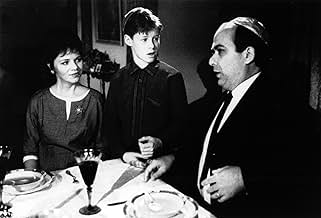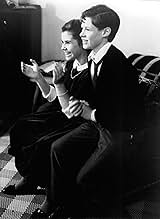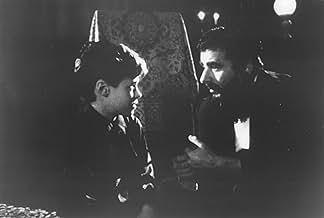Füge eine Handlung in deiner Sprache hinzuA young Jewish adolescent from an overbearing family likes a Christian girl and is helped by a fun-loving rabbi.A young Jewish adolescent from an overbearing family likes a Christian girl and is helped by a fun-loving rabbi.A young Jewish adolescent from an overbearing family likes a Christian girl and is helped by a fun-loving rabbi.
- Regie
- Drehbuch
- Hauptbesetzung
- Auszeichnungen
- 2 Gewinne & 5 Nominierungen insgesamt
Empfohlene Bewertungen
On one level, it is a poignant, funny, warmhearted, intelligent exploration of the tensions inherent in being a stranger in a strange land, in this case, being Jewish in a prairie town in Canada. The leaders of the Jewish community (with good reason) don't feel they have been welcomed by the dominant community of non-Jews in the town, and they struggle to maintain their cultural uniqueness while endeavoring to avoid being seen as "different." But these desires inherently conflict, and they come to the surface via the interactions of the community, the 12-year-old protagonist (a boy who is the movie's truth-teller), his Christian friend and incipient girlfriend (who is also his two-hands piano partner), and a Lubovitcher Hasidic rabbi, who offers wisdom that excites the boy's mind and heart while conflicting with the community's wishes. The story looks unblinkingly at both the nontrivial weaknesses and enormous strengths of Jewish culture, yet could just as well have been about Vietnamese in America, Pakistanis in England or Greeks in Australia.
On another level, it is about the struggle to be true to one's individual nature, as opposed to what society expects of us. The boy has to confront the question "Does honoring your parents always mean complying with their wishes." The rabbi faces the question of how he wants to fulfill his life's mission.
These are serious questions, handled with a deft, light touch, in a script with just the right amount of warmth and wit, in a place that is somehow both familiar and strange, far from the usual Hollywood sets. Oh yes, and the klezmir music is wonderful!
Clearly a 10.
The key conflict is how his, and the young rabbi's, sense of identity, both self and ethnic runs counter to the older generation's perception of those issues. To the older generation, being Jewish means to remain invisible, as if to be ashamed of what they are. Any one deviating from that is shut out and feared. Max and the young rabbi on the other hand, represent a new generation with a real sense of security in their religion and a willingness to share it with outsiders.
The example is shown most distinctly in how the generations celebrate. The old one's are sombre and quiet affairs that are from the outsiders, whereas the younger ones dance and play with an infectious joy that teach those same outsiders the beauty of Jewish culture and do more to help Jewish people than the fear the elders have.
Only when the older generation realizes this, is a peace made when they learn that you can protect your way of life by sharing far more than you can by shutting out.
To have a message as profound as this in a film with all the laughs and beauty is a rarity that you owe it yourself to see.
Maxamillian Glick, as his opening joke about the Jewish man at a Chinese temple will tell you, is a stranger in a strange land, that is, the small Canadian Jewish population which he is part of. As a result of this seemingly strange setting, his family tries to instill on him a stronger sense (and with it stricter rules) of being Jewish. Maxamillian is stuck in a situation where his family and Jewish friends appear far too protecting of their identity.
This is funny in the way we see some of Woody Allen's Jewish upbringing in his earlier films (see Radio Days). For example, they way Maxamillian's family always overreacts when their son decides to do something out of the ordinary like skipping breakfast or going to bed early, his parents and grandparents huddle over the bed debating amongst each other whether they should call a doctor or whether he has gotten all essential vitamins and so forth. It is all so aggravating that his family thinks they have to plan everything for their son, to mold him as they see best for him. Like, they expect he'll either be a surgeon or a lawyer, so they bought him a piano when he asked for a bike.
Max is a good piano player, and is teamed up with a young Polish girl named Delia Brzjinski (a very young Faruzia Balk), which Max's parents forbid him to do for fear that mingling with a Polish girl will somehow spoil his Jewish faith (they talk about intermarriages among religions), even though Max isn't doing anything more than making himself a schoolyard friend. Max respects his family, but at the same time, can't figure out why he can't be friends with Delia.
So, even though his parents expect best of him, Maxamillian's family and Jewish community also tries to force absurd rules of him, revealing how their small Canadian Jewish population has made them too protectorate of their heritage. This forces Max, with the help of a new Rabbi, to do some serious thinking about what's right and wrong, despite what the elders say.
It's a nice little family film, though it tends to drag on at parts. I enjoyed Noam Zylberman, the actor who played Maxamillian Glick, although it appears that he has only made few appearances in the lead whereas most of his film and television credits are simply for additional voices. I do admit, he does have a cartoonish voice.
It has a nice charming coming-of-age story. The characters are endearing with some terrific actors. It's a small town Jewish kid trying to deal with both religion and love at the same time. The production is strictly old-timey Canadiana. It's not high value but even that has a certain charm. The kid is good and Saul Rubinek is terrific. The lower production value limits its cinematic appeal but the material is first rate.
Wusstest du schon
- WissenswertesMany interior scenes were filmed in an abandoned apartment building at 351 Victor Street in Winnipeg. The building had been condemned by the city earlier in 1987, and had no running water or heat when the film crew starting using it a few months later. Eight indoor sets were constructed with 1960s decor, including Rabbi Teitelman's apartment, and the Glick house. After the film's production was complete, the city finished renovating the building for low cost housing.
- Zitate
Rabbi Teitelman: [speaking at a Brotherhood Day gathering] Now, Cohen got a telegram from his son. 'Papa, I'm going to Jerusalem. I'm going to become a Christian.' Oy, vey, he didn't know what to do. He ran to Greenberg, he told him the whole story. Greenberg said, 'It's funny you should mention. I got a telephone call from my son, he said he's going to Jerusalem, he's gonna become a Christian'. What to do? They went to run to the rabbi, they told him the whole sad story. The rabbi said, 'Funny you should mention. My son's going to Jerusalem, he's going to become a Christian, and I'm a rabbi. You can imagine how ashamed I am. What should we do? We have to pray to the Creator, we have to rend our clothes, we have to put ashes on our head, fast for two days.' Two days later, the gates of Heaven opened. The voice of the Creator came down and said, 'My children, what can I do for you?' And each man told him that his son was going to Jerusalem to become a Christian. And then, the voice of the Creator boomed out, 'Funny you should mention... '
- VerbindungenFollowed by Max Glick (1990)
- SoundtracksHoben Mir A Niggundal
Arranged & Performed by Finjan
Top-Auswahl
Details
Box Office
- Bruttoertrag in den USA und Kanada
- 317.670 $
Zu dieser Seite beitragen



























